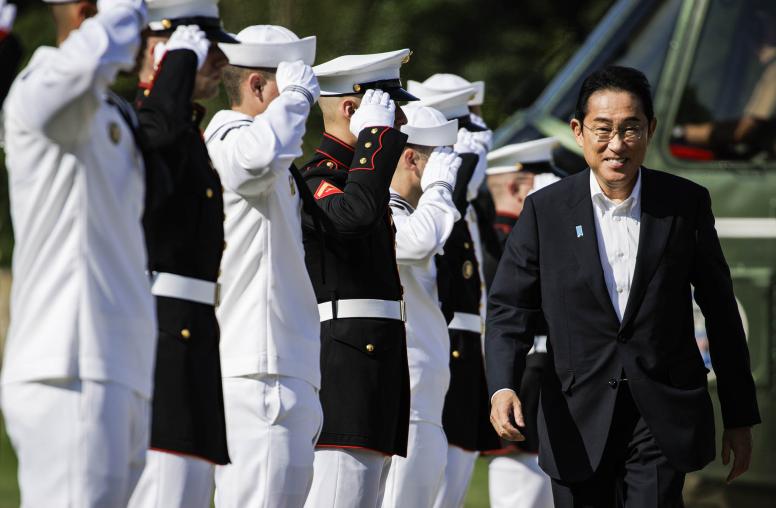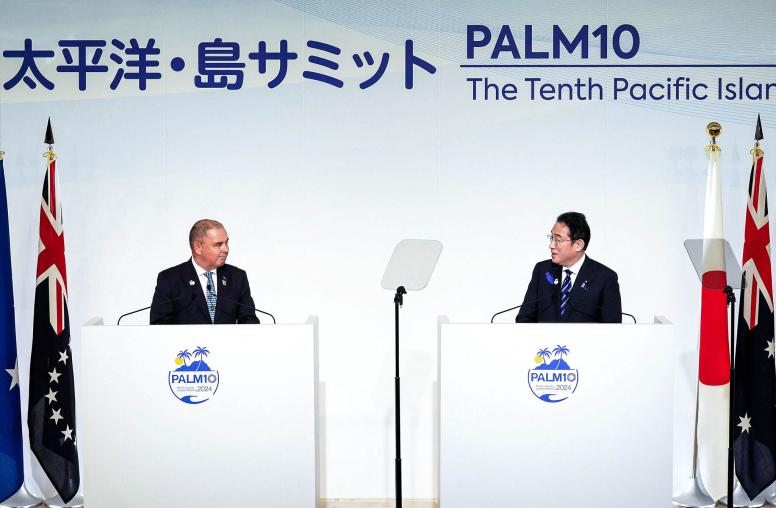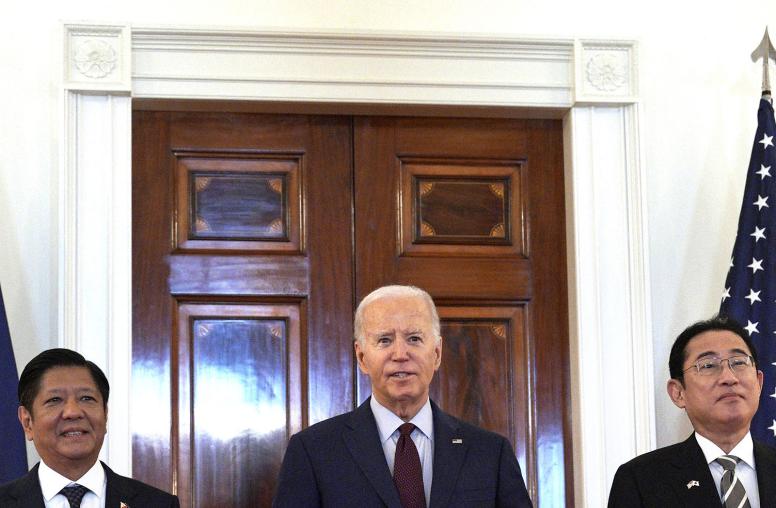Frank Aum on Biden’s Visit to South Korea and Japan
Amid a flurry of Asia diplomatic initiatives, USIP’s Frank Aum says President Biden’s trip is a chance to show the United States is committed to having a major presence in the Indo-Pacific, but that “this is not something that happens in a single summit… We’re going to have to continue to strengthen those efforts.”
U.S. Institute of Peace experts discuss the latest foreign policy issues from around the world in On Peace, a brief weekly collaboration with SiriusXM's POTUS Channel 124.
Transcript
Julie Mason: Frank Aum is senior expert on Northeast Asia at the U.S. Institute of Peace. Here to talk about Biden's trip. Good morning, Frank.
Frank Aum: Good morning, Julie.
Julie Mason: Good to have you. So, this the first time Biden is meeting these two leaders, the new leaders of South Korea and Japan. How do you think that's going?
Frank Aum: By all accounts it went very well. Of course, Biden has been to South Korea before, but this is the first time that he's meeting that new South Korean President Yoon Seok-youl. So, the main priority was really to establish a relationship between the two leaders, build trust. Fortunately, there was already a lot of goodwill built in since their respective policy advisors have a history of working together during previous administrations, but I heard that they bonded well and established rapport over their love of pets and just they have a... And President Yoon himself is very much a pro-U.S. person. So, they had a lot to share and discuss.
Julie Mason: Yeah, I mean, I've read quite a bit about the new South Korean president and even though he was described as very conservative and has very different posture toward North Korea, the foreign policy of that country, particularly with regard to the United States, was not undergoing a significant change.
Frank Aum: That's right. So, there's always a big concern about North Korea because it's, you know, a very close neighbor approximate and North Korea has been conducting a lot of missile tests recently. So, on a policy level, the main focus of the summit was really strengthening deterrence against the North Korean threat. We're hearing reports that it's very possible that we could see another intercontinental ballistic missile range test from North Korea, and even North Korea seventh nuclear test sometime in the near future.
So, at the summit, the two sides agreed to expand the scale and scope of joint military exercises, as well as increased the deployment of U.S. strategic assets to the Korean Peninsula. And both of these things, the military exercises and the deployment of assets, had been on pause since 2018 because the previous administrations, Trump and Moon Jae-in, were both trying to engage with North Korea. And this is exactly what the new Yoon administration wanted. They wanted to beef up the military exercises, they wanted greater displays of resolve and might, like U.S. B52 Bomber missions to the peninsula and a greater U.S. carrier strike group presence. And of course, you know, this approach dovetails nicely with what the Biden administration was seeking, which was a greater combined posture on the Korean Peninsula, not only as a stern signal to North Korea, but also to pressure China to do more to rein in North Korea's bad behavior.
One last point I want to make is that the concern with all these military displays of toughness is that they don't seem to actually deter bad behavior from North Korea. So back in 2013, the alliance engaged in similar deterrence boosting activities in response to North Korean testing. And these moves not only didn't deter North Korea or force it back to the negotiating table, but in the following years, North Korea actually achieved the greatest advances in its nuclear program, including three more nuclear tests and over 90 ballistic missile tests.
Julie Mason: Biden apparently offered North Korea and China some effective vaccine. I'm sure China took that as a huge insult. But even though their vaccine doesn't seem to work very well, but no uptake from North Korea.
Frank Aum: Well, in terms of COVID, there are over two million reported cases of fever-like symptoms. So, it appears that North Korea is encountering a very severe COVID crisis right now. Biden and Seoul also reiterated their offers of assistance, but North Korea has yet to request or accept direct aid from the two countries. There are reports of North Korea bringing in aid from China. There are planes that are flying in from Beijing. But again, North Korea is one of two countries in the world, the other being Eritrea, that has not engaged in a vaccination campaign. So, it's going to be facing a very rough COVID crisis over the next several months on top of its chronic food and health problems.
Julie Mason: You know, it's interesting, Frank, we were speculating a little bit on the show last week that North Korea, even disclosing as much as they did just before Biden's trip, might have been or could be interpreted as a bit of an overture. Like saying, "Hey, we're..." like admitting they're having a COVID problem when we thought all along that they probably had one, but coming out with that before Biden's trip, but I don't know, maybe not. Or maybe it's one of those things that's going to be back channeled. And we won't know about it until a year later, kind of thing.
Frank Aum: Yeah, it's hard to tell why North Korea is making public its COVID crisis right now. It could be that in the past, they were very effective in preventing a major outbreak. They were very severe in their lockdown. And they have the ability, of course, as an authoritarian government to control the movement of people and prevent these sorts of things. But I think right now, it also could be the case that if you don't admit to a crisis, then you can't get aid. And so, maybe they're feeling at this point, they need to admit to it so that they can get more international assistance. But again, the U.S. has been clear in sort of the secret channels about their offers for assistance, and North Korea hasn't seemed to accept just yet. So, we'll see what happens over the next few months.
Julie Mason: Now, Frank, on the China, I mean, on the Japan part of Biden's trip, a few things. Japan is now going to start increasing its defense spending, which Biden was happy to hear. They want a permanent seat on the U.N. Security Council. And they're going to support the U.S. and provide like, sort of, you know, potentially a staging ground if the U.S. gets into it with China over Taiwan. What do you make of all of those things?
Frank Aum: Well, the president is there in Japan right now. I don't want to speak too much to it because the meetings aren't over yet. But those are all goals that they were looking to achieve in Japan. And President Biden reconfirmed his commitment to supporting Taiwan in case of any Chinese intervention there. And so, I think that was a big deal. And typically, we've been more ambiguous in the past about our response to Chinese action there. But Biden was pretty clear about that. So, I think those are all things that Taiwan certainly is probably happy to hear.
Julie Mason: Yeah, for sure. And what about that permanent seat on the U.N. Security Council? Do you think they'll ever reform that and get Russia and China out of there? Or are they just too big to exclude?
Frank Aum: Yeah, that's not going to happen. I think that the permanent seats on the Security Council were something that happened at the end of World War II. I don't see how that can happen without a radical change in the U.N. almost to the point where the U.N. doesn't exist because you won't have those two powers give up their seats. So, you're going to have to have a different system altogether. But it does raise the bigger problem that we have right now. Because we can't get things done in the international community when two of the permanent seats, Russia and China, aren't acting according to international law and norms.
Julie Mason: Yeah, I think the U.N. has not fared well in this Ukrainian conflict.
Frank Aum: Right. Right. And not only that, I mean, just going back to North Korea, and after all the the missile tests that North Korea has conducted, and we're trying to impose additional sanctions through U.N. Security Council resolutions, and Russia and China are just not playing along. They're saying that sanctions are not effective against North Korea. So yeah, the U.N. Security Council is becoming less of an effective body when we can't overcome those two vetoes.
Julie Mason: So, China being like a continued, you know, subtext to his trips to South Korea and Japan. What's the message that Biden has been sending on this trip, to China?
Frank Aum: The overall message is that the U.S. is a major player in the Indo-Pacific region. I know there's been some concerns because despite the fact that, you know, Biden has been emphasizing the Indo-Pacific and our competition, our strategic competition with China, there has been other crises that has been taking up his time. Afghanistan last year, and Myanmar. And then this year, of course, the situation in Ukraine. And so, this is really Biden's opportunity to say, "Hey, we are major players. We are involved. We have a major presence, not only militarily, but also economically, as well with the announcement of the new Indo-Pacific economic framework."
Julie Mason: Seems timely, considering he just hosted the ASEAN conference where a lot of those members were butt sore about the U.S. paying too much attention to Europe and the Middle East and not enough to Asia.
Frank Aum: That's right. And we just heard that there are seven ASEAN countries that will be participating in the Indo-Pacific Economic Framework. They're probably very reassured about U.S. reaffirming its commitment and role.
Julie Mason: But I mean, has the U.S. finally pivoted to Asia, or is it still all work in progress?
Frank Aum: It will always be a continuation and a long-term process. I think that our allies and partners in the Indo-Pacific region always want demonstrations of reassurance, not just militarily, but also in terms of our economic weight and presence. And so, this is not something that happens in a single summit or a meeting or a year. So, we're going to have to continue to strengthen those efforts.
Julie Mason: I mean, I would like to pivot to the south of France, Frank, where would you like to pivot to?
Frank Aum: I'm going to France in a couple of weeks, so that pivot is real for me.
Julie Mason: Oh, man, you're manifesting that. That's fantastic. Frank Aum, senior expert on Northeast Asia at the U.S. Institute of Peace. Thank you so much for joining me.
Frank Aum: Absolutely.
Julie Mason: Great to talk.



